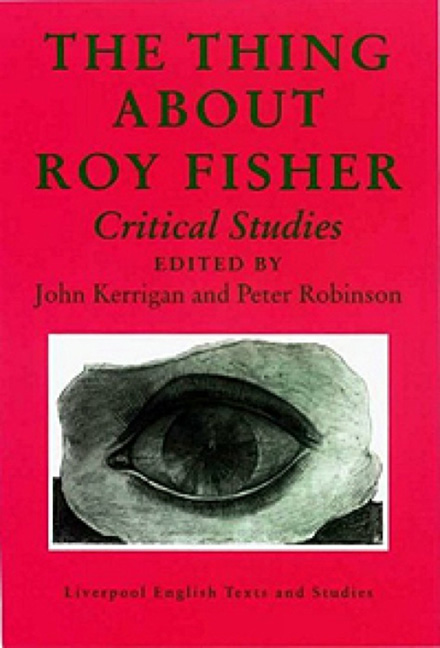Book contents
- Frontmatter
- Contents
- Notes on Contributors
- Acknowledgements
- Abbreviations
- Introduction
- 1 Roy Fisher on Location
- 2 ‘Menacing Works in my Isolation’: Early Pieces
- 3 TheWork of a Left-Handed Man
- 4 Osmotic Investigations and Mutant Poems: An Americanist Poetic
- 5 ‘Making Forms with Remarks’: The Prose
- 6 Cutting-Edge Poetics: Roy Fisher's ‘Language Book’
- 7 A Burning Monochrome: Fisher's Block
- 8 ‘The Secret Laugh of the World’
- 9 ‘Exhibiting Unpreparedness’: Self, World, and Poetry
- 10 ‘Coming into their Own’: Roy Fisher and John Cowper Powys
- 11 A Furnace and the Life of the Dead
- 12 Last Things
- Roy Fisher: A Bibliography
- Indexes
9 - ‘Exhibiting Unpreparedness’: Self, World, and Poetry
- Frontmatter
- Contents
- Notes on Contributors
- Acknowledgements
- Abbreviations
- Introduction
- 1 Roy Fisher on Location
- 2 ‘Menacing Works in my Isolation’: Early Pieces
- 3 TheWork of a Left-Handed Man
- 4 Osmotic Investigations and Mutant Poems: An Americanist Poetic
- 5 ‘Making Forms with Remarks’: The Prose
- 6 Cutting-Edge Poetics: Roy Fisher's ‘Language Book’
- 7 A Burning Monochrome: Fisher's Block
- 8 ‘The Secret Laugh of the World’
- 9 ‘Exhibiting Unpreparedness’: Self, World, and Poetry
- 10 ‘Coming into their Own’: Roy Fisher and John Cowper Powys
- 11 A Furnace and the Life of the Dead
- 12 Last Things
- Roy Fisher: A Bibliography
- Indexes
Summary
‘The plastic flowers // get more approximate: they're not even symbols anymore, only a drained colour’. In this extract from his ‘Prose for Roy Fisher’ John Ash recalls the resistance to ‘symbols’ flaunted by poets convinced, as Eric Mottram puts it, ‘that nothing can really stand for another thing’. Such a conviction issues inwriting that admirers respect for its ‘re-assuringly inductive and empiricist’ credentials; the more sceptical may sometimes detect a selling-short of poetry's possibilities. Teasingly Ash suggests that empiricismmay imprison as much as reassure. Fidelity to perception, he hints, involves acceptance of the fact that things ‘getmore approximate’. In so doing he contributes a characteristically sly insight to a rumbling and sometimes heated poetic debate.
A sign of Roy Fisher's importance is that he turns out to be a poet hard to enlist in poetic camps. His ‘Staffordshire Red’, dedicated to Geoffrey Hill, reads, in part, as a good-humoured riposte to Hill's waywith landscape and history. In place ofHill's tensed formalism, a medium for intimating ironic conflict between ideas and realities, transcendence and the sublunary, Fisher substitutes a conversational, short-lined free verse. Yet Fisher also shows that his style is capable of rhetorical daring as it stretches itself to suggest journeys between different realms: ‘clefts cut in the earth / to receive us living’ may, the poem half-speculates, be the more authentically there for being casually ambushed by the sidling imagination: ‘I had not been looking for the passage, / only for theway’ (P55-87, p.141). The Eliot of Four Quartets is audible behind those last-quoted lines, and in the ensuing movement away from discovery into ‘vacancy’; the poem plays with a deadpan refusal to commit itself to meaning—‘It was as it had been’—that is a signature of Fisher. Where Fisher differs from others writing in an ‘empiricist’ manner is his awareness of that style's potential limitations.
Marjorie Perloff, who likes to assign poets their place on a critical map, takes Pound and Stevens as contrasting types of modern poet: the latter (honoured by Harold Bloom and Helen Vendler) deriving his beliefs and stance from romanticism, and offering ‘a vision of Reality’; the former seeing modernism as a break with romanticism and concerned to make ‘its processes imitate the processes of the external world as we have come to know it’.
- Type
- Chapter
- Information
- The Thing About Roy FisherCritical Studies, pp. 209 - 230Publisher: Liverpool University PressPrint publication year: 2000



